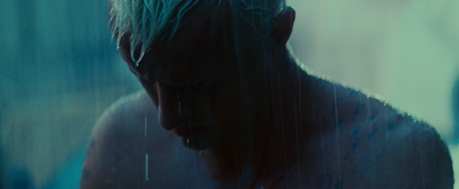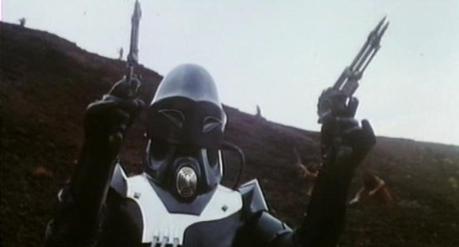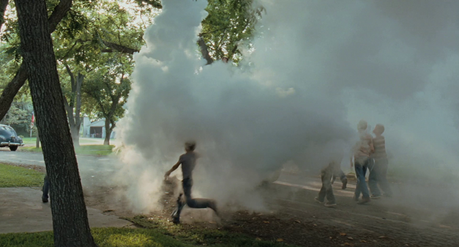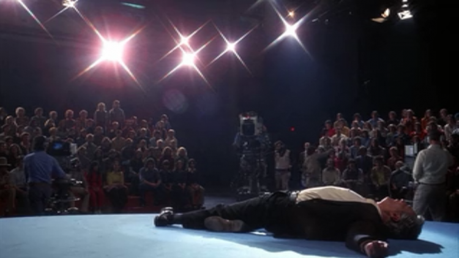Most websites are filled with end of the year “best of 2011″ lists, and we’re not even going to try to throw in our collective voice to that din. Film is so rarely a sequential experience, we rent, buy and download films from every era, from every year. The films that made up our year were wildly varied in time and place, so we posed the questions to our contributors: What was the best film you watched in 2011? There was no prerequisite that it had to be made this year, simply that it stood out as the most memorable or most effective film viewed this past year. Cult classics, established icons, or contemporary powerhouses, these were the films that got our minds buzzing in 2011–
-
Britta R. Moline: Blade Runner (1982)

“I’ve seen things you people wouldn’t believe. Attack ships on fire off the shoulder of Orion. I watched C-beams glitter in the darkness at Tannhäuser Gate. All those moments will be lost in time like tears in rain. Time to die.”
A single film can change so much, can mean so much—a great film is one of the quickest ways to entirely revolutionize your mind. I’ve seen some truly great ones this year: An American Werewolf in London, Antichrist (which almost earned the top prize for me), Santa Sangre, Dogtooth, The Last Temptation of Christ, The Servant, Alien, more. The list goes on into the dozens for masterpieces, and the 200s for decent films.
Films that have truly changed my life/mind (as previously noted) are much rarer still than masterpiece films, and there was perhaps only one this year the managed to do that. Tomes have been written by people much more intelligent than I am about the philosophy of Blade Runner, but its value to me lies in a simple and profound question: What is death? Corollary questions come, then: What do we lose when we die? Is it the moment-by-moment experience of being alive, or is it our memories? How reliable are those memories? Is life a collection of experiences? Why are those experiences important if the memory of them is so fragile?
The film is soaked in a solution of death. The ‘antagonists’ are simply as desperate to survive as the protagonists. In the film’s final fifteen minutes, this race for survival clashes in the most heart-rending and unexpected way, as our antagonist Roy Batty torments protagonist Rick Deckard, chasing him through a dilapidated building, breaking his fingers, and finally forcing him onto the roof. Yet as he does this, Batty is simultaneously teaching Deckard, passing on the knowledge of his own life of servitude, intentionally infusing Deckard once more with the lust of and embrace of life that humankind has lost. When Batty finally traps the prone form of Deckard, when the wolf rounds on his hunter, Batty sits down and simply talks to him. In the moment of death, one of the most beautiful in all of cinema, we watch resistance and acceptance fuse, as Batty sees and appreciates life– all life, not only his own– perfectly, for losing it.
The film is an endless web of questions. What would you say to your creator if the two of you could meet? Would you ask for more life? What defines a meaningful life? What is a human being and what is their responsibility towards other living beings? What is consciousness? Can a human being ever trust something it doesn’t understand? Can a human being ever trust one another, even?
The profound seriousness with which Blade Runner posits these questions is only lightened by the quick pace with which it propels its futuristic thriller narrative. The actors are beautiful, the set is divine, and the direction is flawless, but Blade Runner is a film greater than the sum of its parts. With the operatic elegance of an epic story and depth of a philosophical tract, Blade Runner is the epitome of what film can be: an art, a messy science, a story, a life.
-
Phillip Lozano: Star Crash (1979)

Like George W. Bush, Star Crash is very much a creature of simple tastes dazzled by pretty colors and big machines that go ZOOOOOOOM. Like the former president, there’s no mucking about with Star Crash - you’re either good or evil, for it or against it, and if you’re against it, then you hate freedom and Disneyland.
I’ve been obsessed with this movie ever since I was about 11 years old, ever since seeing a dazzling but brief TV commercial for it on my old black and white Sylvania one afternoon during “Boo! Theater”
– it was among the first of the Star Wars rip-offs green-lighted in the wake of George Lucas’ spectacular success, in this case made by a bunch of resourceful Italians who had never seen the movie they were supposed to be copying, which is all for the better.
There is no characterization in Star Crash, absolutely none – people simply pop out on screen shooting and screaming, or else announce who they are and what they are going to do right before doing it. The closest thing to a character moment we get is the bizarre case of the lead villain shouting his own name (“Zarth Arn! Zarth Arn!”) at random moments for inspiration, or a strangely touching but awkward sequence in which a Texas-accented gunslinger robot proclaims his sweet, sweet love for heroine Stella Star (former Hammer Studios scream queen Caroline Munro).
Given the low, low budget and the need to attract as many eyeballs as possible, lovely Brit Munro provides the generous helping of tits and ass that had been conspicuously missing from Star Wars – yet it remains as eternally chaste. Director “Lewis Coates” (AKA Luigi Cozzi, a protégé of producer Dario Argento) keeps matters strictly PG-rated, despite all the planet-smashing, robot-decapitating mayhem.
The film is, in fact, populated with a bizarrely impressive cast, some of whom must have thought they were signing on for “Star Wars II” before they realized what they had done. Aside from up-and-coming nobody David Hasselhoff in his pre-‘Knight Rider” days, the brain-damaged space opera also features Godfather Part II and Taxi Driver co-star Joe Spinell as Zarth Arn, “Earthquake” and perennial TV guest star Marjoe Gortner as mystical space-fu expert Akton, and Holy Shit is that Christopher Plummer?! It Is! as the Emperor of the Galaxy.
As indicated, I’d been waiting to see this film since I was a kid, and upon its release on DVD and Blu Ray in 2011, it did not disappoint: Star Crash is a wild and woolly camp fest that gives no fucks at all. There’s no plot to speak of, but rather a series of episodes where cool/crazy shit happens with breathtaking rapidity and regularity. Want to get at the main villain in his floating star fortress? Then just pack torpedoes full of soldiers and fire them though the plate glass windows of his HQ, because THIS universe doesn’t give a fuck about blunt force trauma OR explosive decompression in deep space. Need to halt the flow of time so our heroes can escape a doomed planet? Just have Christopher Plummer bark it out to his imperial starship and it happens (though, paradoxically, he can “halt the flow of time” for only five minutes).
It’s a bit of a shame this film isn’t better known outside Europe – it never got any of the merchandising that many of the other late 1970s-early 1980s space operas received, so it’s unlikely I’ll ever get to have my own action figure of Elle, the one-liner robot with a soft spot for Caroline Munro. But that’s not a regret a six-pack of Foster’s and a session with the deluxe two-disc blu ray won’t cure.
-
Garrett D. Tiedemann: Tree of Life (2011)

Will never know that these were once
As quick as foxes on the hill;
And least will guess that with our bones
We left much more, left what still is
The look of things, left what we felt
At what we saw.*
Every year consists of similar films with similar formulas, with the credibility stamps of yesteryear replicated to a deafening end. Terrence Malick’s Tree of Life is nothing of the sort. An attempted account of existence itself and the awe-inspiring details of how life comes to be, this is not a blockbuster entertainment ride, but is so overwhelmingly inclusive and personal in its approach that any failings by traditional standards seem insignificant when compared to the poetry. It’s a new world to excavate, existing in the only medium capable of expressing this story fully. Every frame accounts for itself fully, unwrapping traditions without degradation or arrogance. Whether you like it or not, this is a glimpse into Malick’s soul and the way it experiences the worlds around it.
There will always be another Fast and the Furious or Paranormal Activity waiting in the wings, but Tree of Life stands on its own through a lyricism worth experiencing.
*Excerpt From A Postcard From The Volcano By Wallace Stevens
-
Benjamin van Loon: Combat Shock (1986)
Two years ago, I watched over 350 movies in one year. Last year, I scored just above 220. This year, my numbers have been bad: 190. This wasn’t because I haven’t been watching as much, but simply that I dedicated more time to TV series. Is this a good thing? Hard to tell.
Ultimately, because I went into this year knowing that I would be watching less features, I was more selective with my choices. I dedicated a lot of time to watching the entire Godfather series, for example, and spent more time watching movies that I’ve always heard about but had never seen– The Thing, Cujo, My Dinner With Andre, Cannibal Holocaust, 12 Angry Men, Pink Flamingos, L.A. Confidential, etc. Many of these were great movies, but there were no real gems.
Near the top of my list were two new movies, both of universal proportions: Terrence Malick’s Tree of Life and Lars von Trier’s Melancholia. Both of these films are like prayers to different gods; the former to the god of nostalgia, and the latter to the god of sorrow. They are both powerful and deeply affective in their own ways, and not coincidentally, both of them have been dyed with dim tones of Tarkovsky.
Perhaps my ‘favorite’ film of 2011, however, is a cynical little human interest feature that falls outside of the standard post-traumatic stress disorder character study. It is Buddy Giovinazzo’s 1986 cult feature, Combat Shock. It’s a low budget, often contrived profile of a Vietnam war vet braving the apocalyptic wastes of Staten Island. Though the film is severely flawed, and often laughable (it is currently distributed by Troma), it is not without heart. It is as if David Lynch and Harmony Korine took downers and tried their collective hand at an interpretation of Apocalypse Now. The filth of 1980s Staten Island seeps out of the screen, spoiled milk and all.
-
Abbie Plouff: Rosemary’s Baby (1968)
It’s hard to pinpoint what exactly it was about Rosemary’s Baby that stuck with me so much. This is the first (and at this point, the only) film I’ve seen by Roman Polanski and I went into the film thinking it would be another classic horror tale. Now, having seen it, I wouldn’t even really describe it as “horror.” It’s frightening because there’s very little, if anything, in the film you can trust as a viewer.
There’s something very primal about Rosemary’s fear. It’s natural that she would feel protective of her child, and also that she would feel threatened by shadowy forces. Mia Farrow’s performance is understated, to the point of almost feeling like a beautiful blank slate, which makes it easy for the audience to empathize with her. Ruth Gordon (of Harold and Maude fame) won Best Supporting Actress for her role as the intrusive, endearing, but ultimately evil neighbor. She plays up Polanski’s subtle, bleak humor, at the same time providing a powerful personality for Rosemary’s “blank slate” to shine against.
I felt unsettled for days after I watched this movie. All I wanted to do was watch it again, to hopefully make some kind of mental pact. It wasn’t that the movie was terrifically scary, but rather that I was so intensely unsettled by the idea of it. Part of why I love disturbing movies is that they make me question certain things I value. What scares me, what disturbs me, tells me something about the values I have that I don’t always question.
What really scared me in this film was an issue of trust. I wanted, so desperately, to trust Rosemary because no one else in the movie would. I was reminded of the 1800s when women were believed to have “nervous conditions” and incapable of dealing with their own health, or indeed making rational decisions at all. I wanted, as a viewer, to reverse that. I wanted to believe that Rosemary was giving birth to satan. And then I disturbed myself with the implications. That is how the horror of the film worked for me – either outcome was terrifying, and I left the movie unsure which I preferred.
There are many good movies that I’ve seen in 2011, but none of them come back to me as much as Rosemary’s Baby– not in any sort of life-changing way, but in that sort of way that leaves a stain on your mind.
-
Guy Stridsigne: Network (1976)

With such remarkable films as Taxi Driver, All the President’s Men, Rocky, Carrie, In the Realm of the Senses, and The Omen, 1976 could easily be regarded as one of the greatest years in American cinema history. Network also debuted in 1976, but I did not have the pleasure of viewing it until 2011. Starring Faye Dunaway, William Holden, Peter Finch, Robert Duvall, and directed by the late Sidney Lumet, Network details the events at the Union Broadcasting System while it struggles with poor ratings. After news anchor Howard Beale (Peter Finch) threatens to commit suicide on the air, Diana Christensen (Faye Dunaway) is hired to turn the network around, and asks to take over the news under the entertainment division. Diana uses Beale’s outburst to her benefit, giving him his own show and claiming that he is the, “mad prophet of the airwaves.” Predictably, the ratings soar making “The Howard Beale Show” the #1 program on television. News Entertainment is born.
Entering the film with a hesitant interest, I was quickly won over by the film’s captivating script, believable performances, and erudite monologues. At the film’s core, it examines the existence of merit outside of commercial success; whether that be art, news, or a human life. The utter disregard of human liberty exhibited by the corporations both infuriated me and beseeched me to exclaim, “I’m as mad as hell, and I’m not going to take this anymore!”

